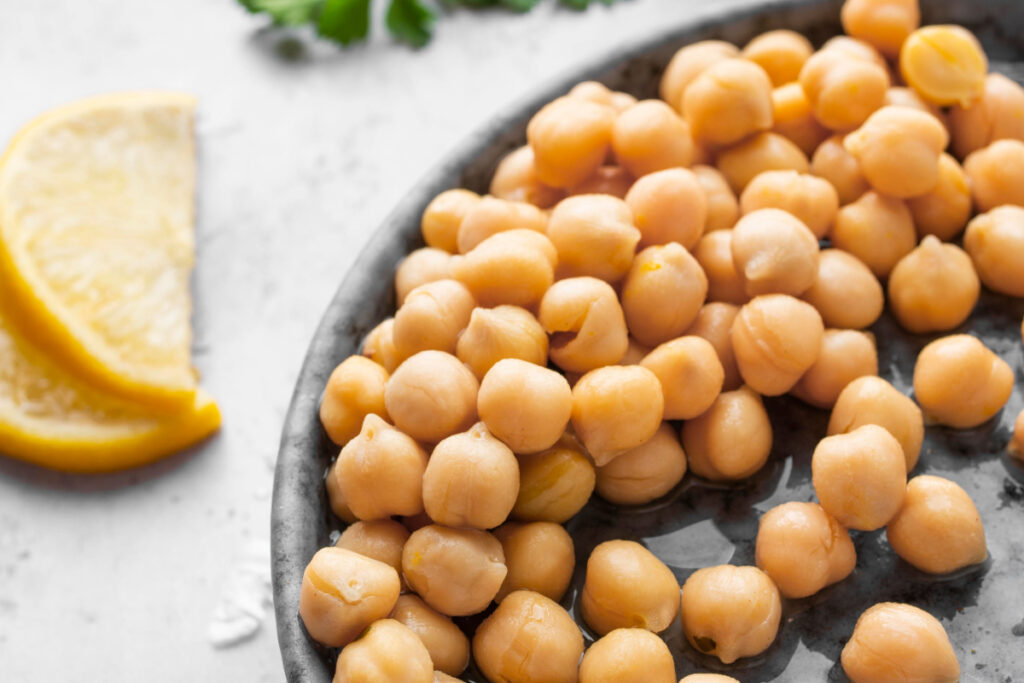The spiritual significance of chickpeas is deeply rooted in ancient cultures and spiritual traditions around the world. Revered for their association with abundance, resilience, and unity, chickpeas—also known as garbanzo beans—carry symbolic meaning that goes far beyond the plate. By exploring their historical origins, cultural relevance, and presence in modern spiritual practices, we uncover the deeper meaning behind this humble legume.

Table of Contents
Chickpeas in Ancient Rituals and Civilizations
For over 7,000 years, civilizations have cultivated chickpeas, making them one of the earliest domesticated crops. Ancient societies valued chickpeas not only for sustenance but also for their symbolic importance.
Symbol of Fertility and Abundance
In Mesopotamia, farmers viewed chickpeas as symbols of fertility and prosperity. They offered these legumes to agricultural deities during rituals to ensure bountiful harvests. Similarly, ancient Mediterranean communities revered chickpeas as representations of life’s cyclical nature, recognizing their resilience and nourishment.
Connection to Deities
Both Greek and Roman cultures included chickpeas in their offerings to gods. By doing so, they demonstrated gratitude for nature’s abundance. This practice also reflected their belief in chickpeas as symbols of humility and devotion.
For a deeper understanding of chickpeas’ historical roles, explore the cultural significance of chickpeas.
The spiritual significance of chickpeas has been acknowledged in ancient texts, rituals, and sacred agricultural practices.
Chickpeas in Religious Practices
Chickpeas have played a vital role in the spiritual practices of major religions, where they symbolize sustenance, devotion, and unity.
Judaism
In Jewish traditions, chickpeas hold special meaning during Purim. The holiday commemorates Queen Esther’s bravery, and chickpeas symbolize her commitment to a kosher diet while living in the Persian court. As a result, they have become a staple in Jewish culture, signifying faith and perseverance.
Hinduism
Hindus frequently use black chickpeas in rituals like Navratri. These legumes represent health, spiritual renewal, and purification. Devotees prepare and consume them during fasting periods to honor their connection with the divine.
Christianity
Chickpeas often appear in Christian monastic traditions. During fasting, monks consumed chickpeas as a symbol of humility and devotion. This practice reflects their ascetic values and spiritual discipline.
Chickpeas’ use across these religions demonstrates their universal appeal as a symbol of sustenance and faith. To see their significance in a modern recipe, visit the Marry Me Chickpeas recipe.
From Sufi mysticism to Hindu rituals, the spiritual significance of chickpeas spans both Eastern and Western traditions.
Folklore and Mythology
Many cultures feature chickpeas in their folklore, often highlighting themes of protection, endurance, and transformation.
- Eastern European Folklore: People believed scattering chickpeas could protect against evil spirits. According to legends, demons became distracted by counting the grains, leaving humans unharmed.
- Middle Eastern Stories: Chickpeas symbolized fertility and life-giving energy, often appearing in rituals to bless families or marriages.
- African Myths: In Africa, chickpeas represented abundance. Communities used them in ceremonies to invoke prosperity and celebrate new ventures.
These stories reveal how chickpeas have inspired resilience and resourcefulness throughout history.
Chickpeas as a Symbol of Unity and Harmony
Chickpeas continue to foster connection and gratitude in communal meals across cultures. They often feature prominently in dishes that bring people together:
- Middle Eastern Cuisine: Meals like hummus and falafel embody unity, as they are traditionally shared among family and friends.
- Spiritual Gatherings: Chickpeas appear in rituals where food strengthens bonds, reinforces mindfulness, and encourages gratitude.
The communal nature of chickpea dishes reminds us of their role in fostering harmony. For another example of food that unites, explore the ultimate guide to avocado toast seasoning.
Metaphysical Interpretations of Chickpeas
In metaphysical practices, chickpeas symbolize strength, grounding energy, and inner wealth.
Strength in Vulnerability
With their hard outer shell and tender interior, chickpeas symbolize the balance between resilience and vulnerability. This duality reminds us to embrace challenges and personal growth.
Grounding Energies
Many spiritual practitioners consider chickpeas a grounding food. By anchoring individuals to the Earth’s energy, chickpeas promote presence and stability, especially during meditation or mindfulness exercises.
Inner Wealth and Simplicity
Despite their modest appearance, chickpeas offer rich nutrition. They symbolize the idea that true wealth comes from within, aligning with teachings that emphasize self-awareness and humility.
Learn how chickpeas can enhance mindfulness practices by exploring the Marry Me Chickpeas recipe.
Chickpeas in Dream Interpretations
Dreaming about chickpeas often carries messages of growth, rewards, and challenges:
- Hard Work and Reward: Chickpeas in dreams may represent persistence and the success that follows.
- Abundance and Gratitude: A plentiful supply of chickpeas symbolizes blessings and prosperity.
- Spiritual Growth: Dreams featuring chickpeas often indicate overcoming obstacles to achieve personal transformation.
These interpretations highlight the connection between chickpeas and life’s ongoing journey of self-discovery.
FAQs About the Spiritual Significance of Chickpeas
What do chickpeas symbolize in spirituality?
Chickpeas represent abundance, resilience, and unity. They also symbolize humility and inner strength.
Why are chickpeas used in religious ceremonies?
Chickpeas reflect sustenance and devotion, making them a common feature in rituals across Judaism, Hinduism, and Christianity.
What is the connection between chickpeas and meditation?
Chickpeas are grounding foods, helping individuals focus and connect with the Earth’s energy during meditation.
Do chickpeas have metaphysical powers?
Yes, chickpeas are considered symbols of simplicity, inner wealth, and the balance between vulnerability and strength.
Chickpeas in Modern Spiritual Practices
Today, chickpeas continue to play an important role in spiritual and wellness movements:
Holistic Health
Chickpeas are often included in spiritual diets that emphasize balance between body and mind. Their nutrient-dense profile nourishes the body, while their symbolism inspires mindfulness.
Eco-Spirituality
As a sustainable crop, chickpeas align with eco-conscious spirituality. They require minimal water and resources, reflecting values of environmental stewardship.
To align your diet with these principles, explore this banana bread recipe without butter, which highlights plant-based cooking.
Chickpeas and Mindful Eating
Incorporating chickpeas into your meals encourages mindful eating. To practice this, consider:
- Reflecting on the origins of your food and its journey to your plate.
- Sharing chickpea-based dishes with loved ones to foster gratitude and connection.
- Choosing chickpeas as a sustainable, eco-conscious food source to align with spiritual values.
Final Thoughts
The spiritual significance of chickpeas extends far beyond their role as a food source. They symbolize strength, abundance, resilience, and community. From their use in ancient rituals to their role in modern mindfulness practices, chickpeas teach us to value simplicity and foster gratitude.
As you prepare your next chickpea dish, take a moment to reflect on their profound cultural and spiritual legacy. Whether shared in a communal setting or used in meditation, chickpeas remind us of our connection to one another and the Earth.
Even in modern wellness circles, the spiritual significance of chickpeas is being rediscovered as part of mindful eating and energy alignment.
Embrace the humble chickpea as a symbol of nourishment, unity, and spiritual growth, enriching both your meals and your mindfulness practices.
